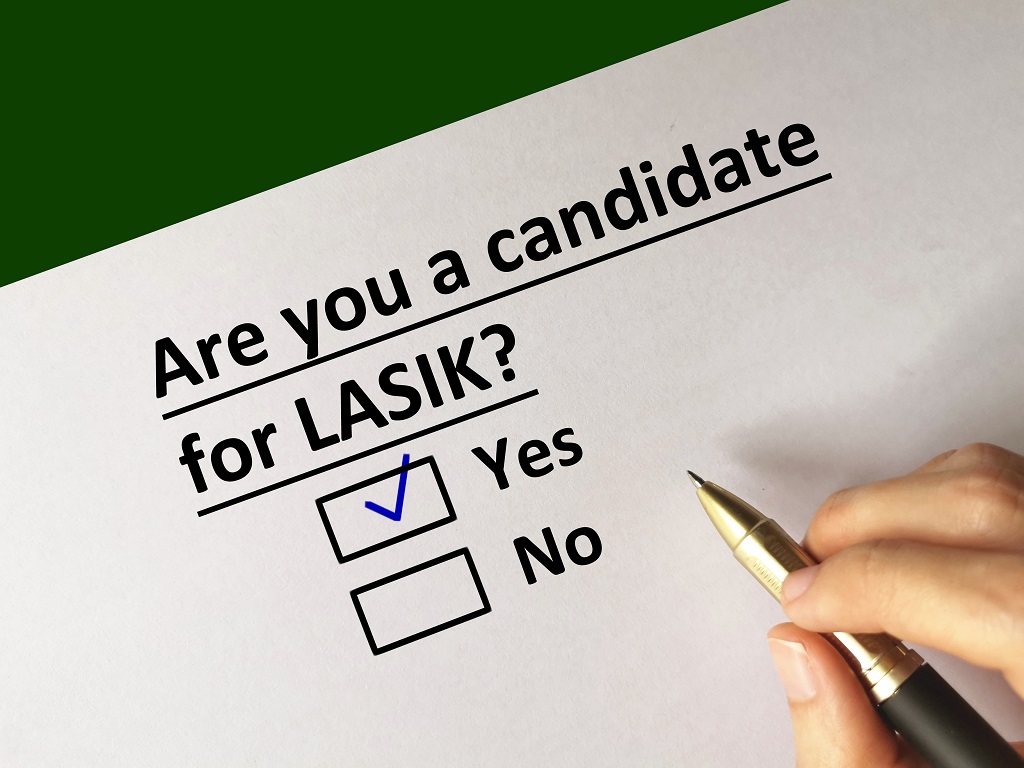
Updated: May 11, 2023
The pros and cons of LASIK surgery and other refractive procedures are important to understand prior to moving forward with surgery. LASIK has many advantages, including relative freedom from visual aids like glasses and contacts. LASIK is certainly safe, effective, and well-accepted since its inception in the mid-1990s. Despite the advantages of LASIK, risks can occur as with any surgical procedure. A comprehensive evaluation by an active and experienced LASIK surgeon and the team is necessary for the patient to make an informed decision about options beyond glasses and contact lenses.
The term LASIK stands for Laser-assisted in situ Keratomileusis. A laser is used to change the surface curvature of the cornea by removing stroma, tissue within the cornea that is responsible for the structure or form of the cornea. LASIK is one of the most commonly performed elective procedures in the world and has been in widespread use since the mid-1990s to correct nearsightedness, farsightedness, and astigmatism. LASIK is conducted as an outpatient procedure in an eye surgeon’s office-based laser suite. The results are near immediate and typically allow for a person to return to full visual function within one day.
The goal of LASIK is to reduce, if not eliminate, the need for glasses or contact lenses for most visual needs. LASIK can be a life-changing procedure for those who have suffered poor unaided vision for most of their lives. With improved vision, patients can confidently approach situations in life that may have been insurmountable without glasses or contacts prior to surgery.
LASIK quickly, effectively, and safely improves vision for virtually all patients in almost all circumstances. The expectation of surgeons and patients alike is for the postoperative vision to equal if not exceed the preoperative vision with glasses or contact lenses. Most patients attain 20/20 unaided vision after LASIK if their eyes could be corrected to this level with glasses or contacts before surgery.

Patients can expect to spend a total of 90-120 minutes at the laser center on the day of surgery. A preoperative exam is required, and the bulk of the time is spent preparing the patient for surgery with relaxing medicines. LASIK itself is relatively quick, with the typical time of the procedure being 20 minutes. Vision is typically acceptable for legal driving within four hours after surgery.
The goal with LASIK is to minimize, if not eliminate, contacts and glasses for most activities. For most patients, this is the result. If a patient is over the age of 40 and elects to treat both eyes for distance, they will likely need glasses for reading and computer usage at some point. Many years after surgery, some patients may find that their vision is not as sharp as it once was after LASIK. At this point, it is not that the LASIK has regressed or ‘failed’, but the natural lens has modified the power of the eye.
LASIK is an affordable option for most patients, especially when compared to the long-term cost of glasses and contact lenses. To cover the larger upfront investment in LASIK, many patients are eligible for fee reductions through health insurance, vision correction surgery financing options, and medical savings plans.
Like all surgical interventions, LASIK and other vision correction procedures have known risks and side effects. Consideration of risk tolerance needs to be determined for every patient with a reputable surgeon and refractive team. Some people are not suitable candidates for LASIK or other refractive procedures based on individual anatomy or the degree of correction needed.
Most side effects and adverse events with LASIK are minor, temporary, and can be overcome with proper attention. Relative dryness is typically short-term in nature (6 months) and may require more frequent drops or other dry eye therapies. Other side effects may be glare, halos, and starbursts when looking at lights at night, which are due to the correction not being ‘spot on. In these instances, an enhancement laser correction may be recommended. The need for enhancement surgery is in the low single-digit percentage and would be known in the first few months after surgery.
Potential complications associated with LASIK include infection and significant inflammation, which are possible but exceedingly uncommon. Lesser complications, such as over-or under-correction, can be treated when recognized after surgery. Flap-related complications can occur, but these have been significantly reduced with continued technological advances. An active, experienced, and qualified surgeon will have very low complication rates.

Six essential factors will help determine if you are a good LASIK candidate.
Furthermore, the best way to determine if you are a candidate for LASIK is to work with a highly qualified surgeon and refractive team and have a complete evaluation of your eyes and vision. Working together with your surgeon and refractive team, you will have the information you need to make the best decision for you.
If you are tired of wearing glasses, having your glasses fog up, dealing with the ins and outs of contact lenses, or managing eye dryness and discomfort, then LASIK or another refractive procedure may be a good option to consider. Don’t hesitate to contact us at Discover Vision Centers!